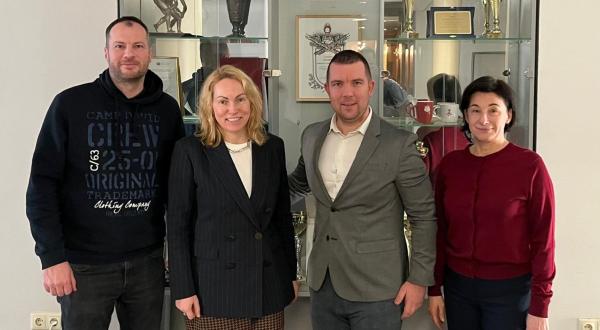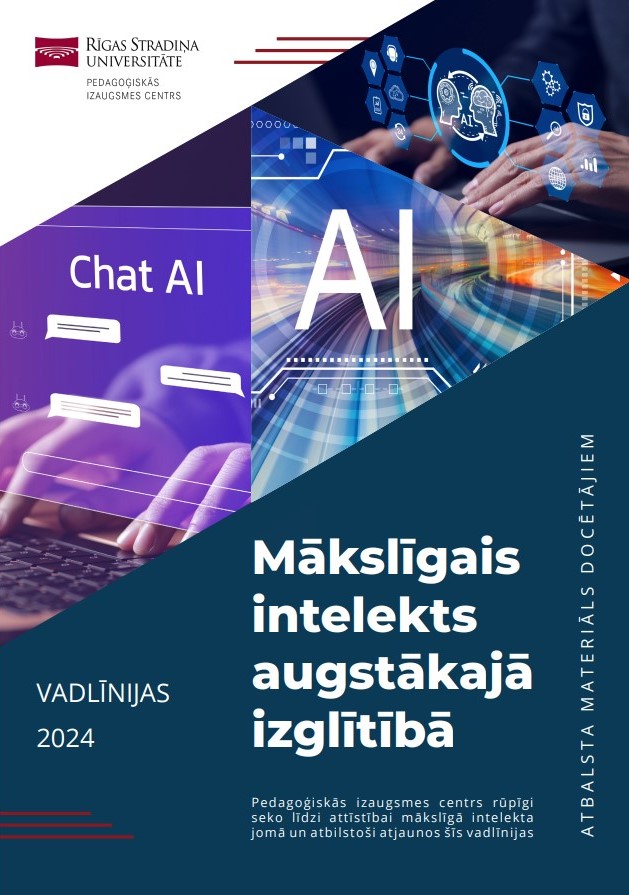RSU develops first guidelines in Latvia for the use of AI in higher education
The Rīga Stradiņš University (RSU) Centre for Educational Growth (CEG) has developed “Artificial Intelligence in Higher Education” as a resource for lecturers, which is the first publication of its kind in Latvia.
Artificial intelligence (AI) has become an integral part of the social and educational environment, especially since generative intelligence is now a tool that is widely available to anyone with access to the internet. Experts from the CEG have developed AI Guidelines*, which describe an approach to using AI in the learning process. The guidelines are based on the views of educational researchers, the pedagogical practice of leading universities worldwide, and RSU.
The aim of the guidelines is to provide practical recommendations for lecturers and students on the use, restriction, and acquisition of AI in the study process.
‘AI has become an integral part of the social and educational environment. It is therefore important to be able to critically evaluate not only the advantages of these solutions, but also the ethical, paedagogical, and practical challenges for its responsible and full use,’
explains the Director of the RSU CEG, Assoc. Prof. Nora Jansone-Ratinika.
‘We invite lecturers to
- reflect on how AI can be used and when and how using AI should be allowed and encouraged in the study process,
- decide on restrictions to the use of AI; restrictions should be specific and linked to particular situations and reasons so that these can be effectively communicated to students,
- consider cases where the use of AI in a course should be prohibited.’
Integrating AI in the learning process will enable students to become more prepared for the professional environment where AI solutions are rapidly and increasingly being used. This will ensure that their academic path meets the requirements of future workplaces. The guidelines focus on the ways in which AI can make a significant contribution to one of the outstanding challenges of modern education – the personalisation of learning – enhancing learner engagement and improving learning outcomes. This includes both generative intelligence and learning analytics solutions, as well as the introduction of digital learning assistants into learning environments and tailoring learning experiences according to students’ needs and learning styles.
While significant investments in the field of AI are expected to enhance work efficiency and replace various aspects of human labour, there is immeasurable value in human creativity, empathy, and critical thinking, which the guidelines encourage keeping at the forefront of higher education. The guidelines outline ideas on how AI solutions can support study course planning and content development, how lecturers can tailor ideas to their study courses, foster student collaboration, active learning, self-regulated learning skills, and other important aspects.
The guidelines provide:
- explanations of widely used terms,
- a description of AI solutions and their relevance to paedagogy,
- recommendations for responsible AI use for academic staff and students,
- practical insights into strategies for using AI tools to enhance the learning experience,
- an approach for how to integrate AI solutions with traditional teaching and learning methods, thereby strengthening the values of student-centred education,
- a compilation of generative intelligence tools, complemented by ideas for their use in higher education context.
The guidelines are intended to serve as an inspiration for lecturers to dare to experiment with AI tools, share their experiences openly, and work together to create an environment where the possibilities of using AI solutions are continually being explored, not only from formal materials but also by drawing inspiration from each other for how to implement innovative ideas.
The RSU Centre for Educational Growth closely monitors developments in the field of AI and will update the guidelines accordingly.
* The guidelines are uploaded to the RSU Study Material Repository and are available on the RSU Centre for Educational Growth website (in Latvian).
Related news
 RSU LASE and the Latvian Cycling Federation develop new cooperation opportunitiesDevelopment, Sports
RSU LASE and the Latvian Cycling Federation develop new cooperation opportunitiesDevelopment, Sports



